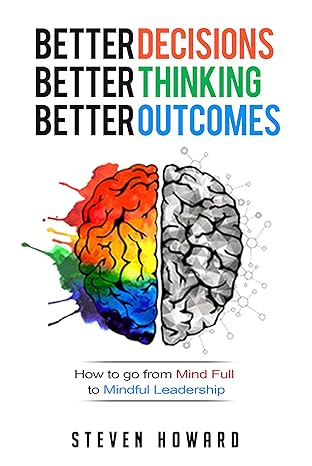7 Lifestyle Choices
That Reduce the Risk
of Dementia
ZOOM-IN FREE TODAY, 27 JUNE
https://us02web.zoom.us/j/8044024005?pwd=dEZ5SGZ5d0ZDSmZIMFBPN00vTGt2UT09&omn=84465025741
Meeting ID: 804 402 4005
Passcode: 6RLzyR
9 PACIFIC,
12 NEW YORK,
1 BRASIL,
5 Happy Hour LONDON / DUBLIN / LISBON
6 CAPE TOWN / GENEVA
7 UKRAINE,
8 DUBAI,
To
LIFE !



Silver Award Winner, Nonfiction Authors Association Book Awards
Distinguished Favorite Award, Leadership Category, 2019 Independent Press Awards
Stress and our overloaded brains are two of the underlying causes creating conflict, tension, and drama in the workplace.
They also result in poor decision making and less-than-optimal thinking by leaders at all levels of the workforce.
Daily juggling of data, reports, email, meetings, decisions, and way too much information has leaders operating in “mind full” modes. This is not good. A more effective method is to make decisions in a mindful mode, a skill that can be learned.
As a leader, the decisions you make and execute shape the lives of team members, colleagues, direct reports, customers, suppliers, and the communities in which you operate and live.
Unfortunately, the majority of leaders are unaware of how stress, multitasking, and overtaxed brains trigger poor decisions, thinking, and outcomes.
This book will help readers become more cognizant of when stress is triggering them toward poor decision making. It will also help leaders become more aware of the many benefits that mindfulness practices will bring to their decision-making and thinking capabilities.
Key topics include:
- How stress leads to poor decision making.
- The impact and benefits of mindfulness for leaders.
- Steps for reducing stress.
- Techniques for shifting into mindfulness at work and elsewhere.
- Brain facts and myths.
- Tips for improving brain health.
- Mindfulness techniques that can be used at work and elsewhere.
- Mindfulness meditation techniques that can be used at work and elsewhere.
Additionally, Better Decisions. Better Thinking. Better Outcomes. delves into some of the latest neuroscience research on the steps that all of us can take to protect our brains and manage the health of our brains well into our elderly years.
Unfortunately, we are entering an era when increasing dementia, Alzheimer’s disease, and stroke are going to hit individuals, families, and society hard. Current estimates predict the United States will see a 60% increase in Alzheimer’s disease and other forms of dementia by 2030 from today’s already staggering levels.
Fortunately, using the techniques and tips in this book, such an increase is preventable.
But only if the right actions are taken now, by you, your family members, your work colleagues, and everyone else.
By helping ourselves, and one another, take the proper steps to enhance brain health, we can reduce the financial costs to society — and the brutal emotional costs to families — of dementia and Alzheimer’s disease.
This book shares some of the new scientific research that shows how mindfulness, stress relief and management techniques, meditation, and better dietary habits could slow and even postpone the debilitating effects of dementia and Alzheimer’s disease.
You will also learn about new neuroscientific studies showing that neuroplasticity – the ability to grow neuronal connectivity across the brain – can continue well into our 70s.
The techniques described in this book will help you make better decisions and improve your thinking prowess.
They will also result in you becoming a less stressed and far healthier person.
Those are four great outcomes that will benefit you immediately, and for years to come.

7 Lifestyle Choices
That Reduce the Risk
of Dementia
As June is both Alzheimer’s and Brain Awareness Month and Men’s Health Month, I want to share with you seven lifestyle choices you can make to reduce your risk of suffering from these devastating diseases.
As I shared in a previous article, Why Leaders Should Worry Now About Alzheimer’s and Dementia, Alzheimer’s is a disease that can be in the brain for as long as 20 years before you are symptomatic.
This is one of the primary reasons why everyone, especially leaders, should start making these necessary lifestyle changes as soon as possible. You are never too young, too fit, too mentally acute, or too smart to put off thinking about the long-term health of your brain.
No one is sure yet why more women than men are affected by Alzheimer’s. However, it is suspected that hormones, the changes that occur as a result of menopause and the years leading up to it, during which estrogen levels start to plummet, play a factor. As neuroscientist Lisa Mosconi notes, “As estrogen declines, it leaves the brain a little bit unprotected and vulnerable to everything else. When women are in their 40s, their brains really start to look like they are aging faster than the brains of men who are exactly the same age.”
Perhaps most worrisome, considering the growing obesity epidemic around the world, elevated blood sugar and prediabetes can double your odds for dementia and Alzheimer’s disease.
Research by scientists at the University of Bordeaux in France, published in the Journal of the American Medical Association, studied over 6000 participants all above the age of 65. They concluded that seven lifestyle choices increase the risk of dementia:
Smoking
BMI over 25
Not exercising regularly
Not eating fish twice a week or fruit and vegetables three times a day
Having high blood pressure (hypertension)
Having high cholesterol
Having high blood sugar
Interestingly, but again not surprisingly, following the Mediterranean diet reportedly can delay Alzheimer’s disease by as long as three years, and perhaps even help prevent it completely. Several population studies have found that those who eat a Mediterranean diet — mostly plants, fish, and olive oil with limited intake of red meat, sugar, and processed foods — tend to be less prone to Alzheimer’s disease.
The good news is that lifestyle changes have proven to work for both long-term brain and body health. A large study of more than 21,000 American adults aged over 65 found that the prevalence of dementia had fallen by 25% over the 12 years from 2000 to 2012. In their paper presenting these findings, the researchers suggested this decrease may be due to increases in education and better control of risk factors for high cholesterol and high blood pressure.
Studies such as this provide some optimism — and clearly defined roadmaps — for taking charge of brain health through the use of tools, techniques, and general lifestyle choices that are likely to improve mental function, strengthen heart health, and reduce the occurrences and impact of elevated and chronic stress.
For more information on this important topic, watch this 10-part series of short videos on Building and Maintaining Long-Term Brain Health.
This article is partially excerpted from my award-winning book Better Decisions Better Thinking Better Outcomes: How to go from Mind Full to Mindful Leadership, available on Amazon in paperback, Kindle, and audiobook formats. The book received a Silver Award from the Nonfiction Authors Association for bringing “a comprehensive plan of action for improving life through recognizing decision-making patterns that don’t serve us well, don’t enrich our lives, and don’t bring us to our goals and dreams.” It also received a Distinguished Favorite Award in the 2019 Independent Press Awards leadership category.
NEVER ask- Do you know who I am???
That causes anxiety.
June is Alzheimer’s Awareness Month…you’re never more aware than when this disease hits your family!
1. If I get dementia, I want my friends and family to embrace my reality.
2. If I think my spouse is still alive, or if I think we’re visiting my parents for dinner, let me believe those things. I’ll be much happier for it.
3. If I get dementia, don’t argue with me about what is true for me versus what is true for you.
4. If I get dementia, and I am not sure who you are, do not take it personally. My timeline is confusing to me.
5. If I get dementia, and can no longer use utensils, do not start feeding me. Instead, switch me to a finger-food diet, and see if I can still feed myself.
6. If I get dementia, and I am sad or anxious, hold my hand and listen. Do not tell me that my feelings are unfounded.
7. If I get dementia, I don’t want to be treated like a child. Talk to me like the adult that I am.
8. If I get dementia, I still want to enjoy the things that I’ve always enjoyed. Help me find a way to exercise, read, and visit with friends.
9. If I get dementia, ask me to tell you a story from my past.
10. If I get dementia, and I become agitated, take the time to figure out what is bothering me.
11. If I get dementia, treat me the way that you would want to be treated.
12. If I get dementia, make sure that there are plenty of snacks for me in the house.
Even now if I don’t eat I get angry, and if I have dementia, I may have trouble explaining what I need.
13. If I get dementia, don’t talk about me as if I’m not in the room.
Find someone who can help you, or choose a great new place for me to live.
15. If I get dementia, and I live in a dementia care community, please visit me often.
It’s not my fault.
17. If I get dementia, make sure I always have my favorite music playing within earshot.
18. If I get dementia, and I like to pick up items and carry them around, help me return those items to their original place.
19. If I get dementia, don’t exclude me from parties and family gatherings.
20. If I get dementia, know that I still like receiving hugs or handshakes.



